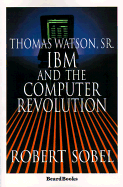|
|
|
|
||||||

|
Thomas Watson, Sr.: IBM and the Computer Revolution
By Robert Sobel 2000/08 - Beard Books 1893122824 - Paperback - Reprint - 368 pp. US$34.95 This book was the first major exploration of IBM and the men who led it. It quickly became a classic as it chronicled the company's extraordinary past and dynamic present and forecast its promising future. Publisher Comments
When the original publication appeared in 1981, IBM was the corporate giant on the cutting edge of the electronic era and the computer revolution. The book was the first major exploration of IBM and the men who led it. It quickly became a classic as it chronicled the company's extraordinary past and dynamic present and forecast its intriguing and promising future. In this spellbinding book Robert Sobel traces the history IBM from its modest beginnings as the National Cash Register (NCR) under Thomas Watson, Sr., the young man from the farm who went to the city and made good through pluck and luck. He shows how this astonishing corporate entity forged ahead of all others and defined the electronic world according to IBM through technological developments, management techniques, and sales campaigns. No book review available Robert Nathen Sobel was a professor of business history at Hofstra University for more than forty years and held a Ph.D. from New York University. He is author of more than two dozen books on American economic and business history, including Herbert Hoover and the Onset of the Great Depression and Coolidge: An American Enigma.
Besides producing books, articles, book reviews, scripts for television
and audiotapes, he was a weekly columnist for Newsday from 1972 to 1988.
In 1998, Sobel was the recipient of the second Special Achievement
Sidewise Award for Alternate History for this book, which was republished
in 1998.At the time of his death he was a contributing editor to Barron's
magazine He died Wednesday, June 2, 1999 of brain cancer. Professor Sobel
was 68. Sobel is a highly esteemed business historian. Sobel's purpose in
any book he wrote was to help his reader learn from them. Enigma.
Besides producing books, articles, book reviews, scripts for television
and audiotapes, he was a weekly columnist for Newsday from 1972 to 1988.
In 1998, Sobel was the recipient of the second Special Achievement
Sidewise Award for Alternate History for this book, which was republished
in 1998.At the time of his death he was a contributing editor to Barron's
magazine He died Wednesday, June 2, 1999 of brain cancer. Professor Sobel
was 68. Sobel is a highly esteemed business historian. Sobel's purpose in
any book he wrote was to help his reader learn from them.
|
|
|
|
home
| about us
| contact us
| related
sites |